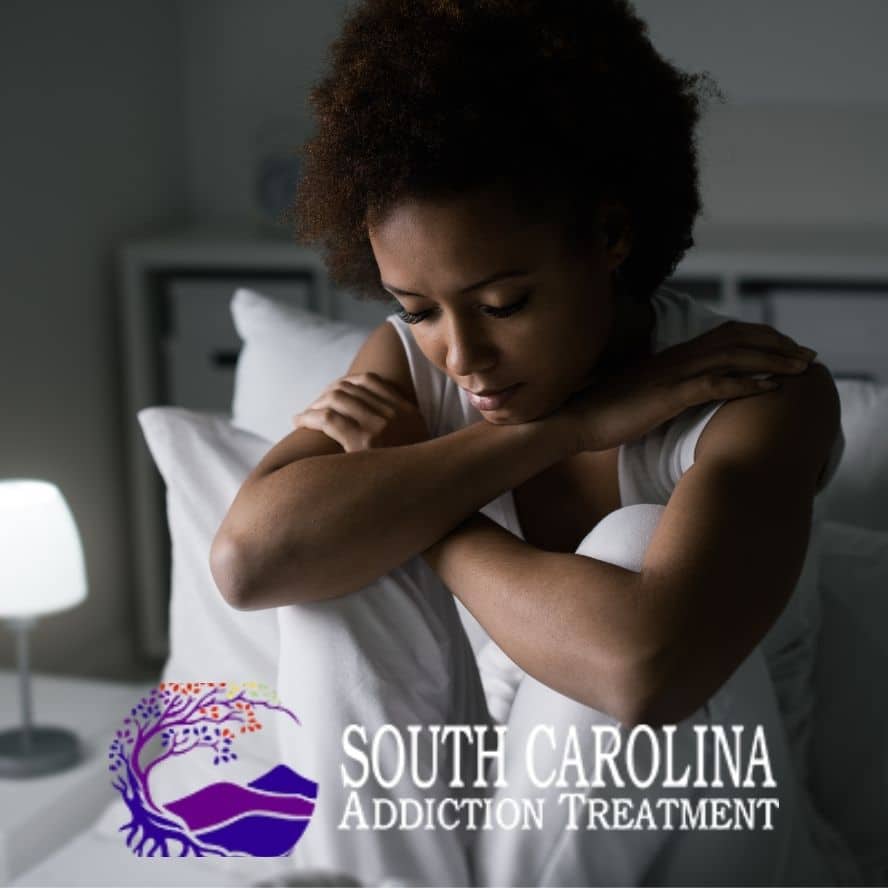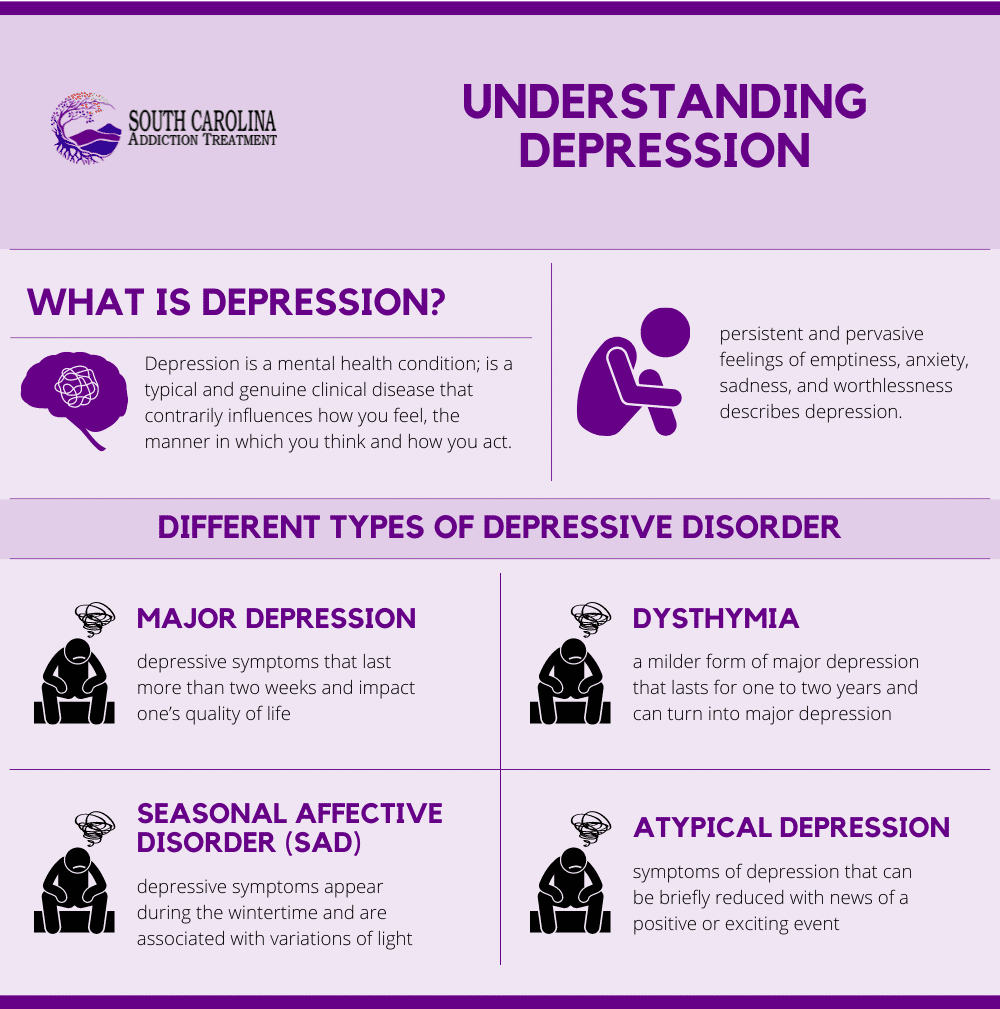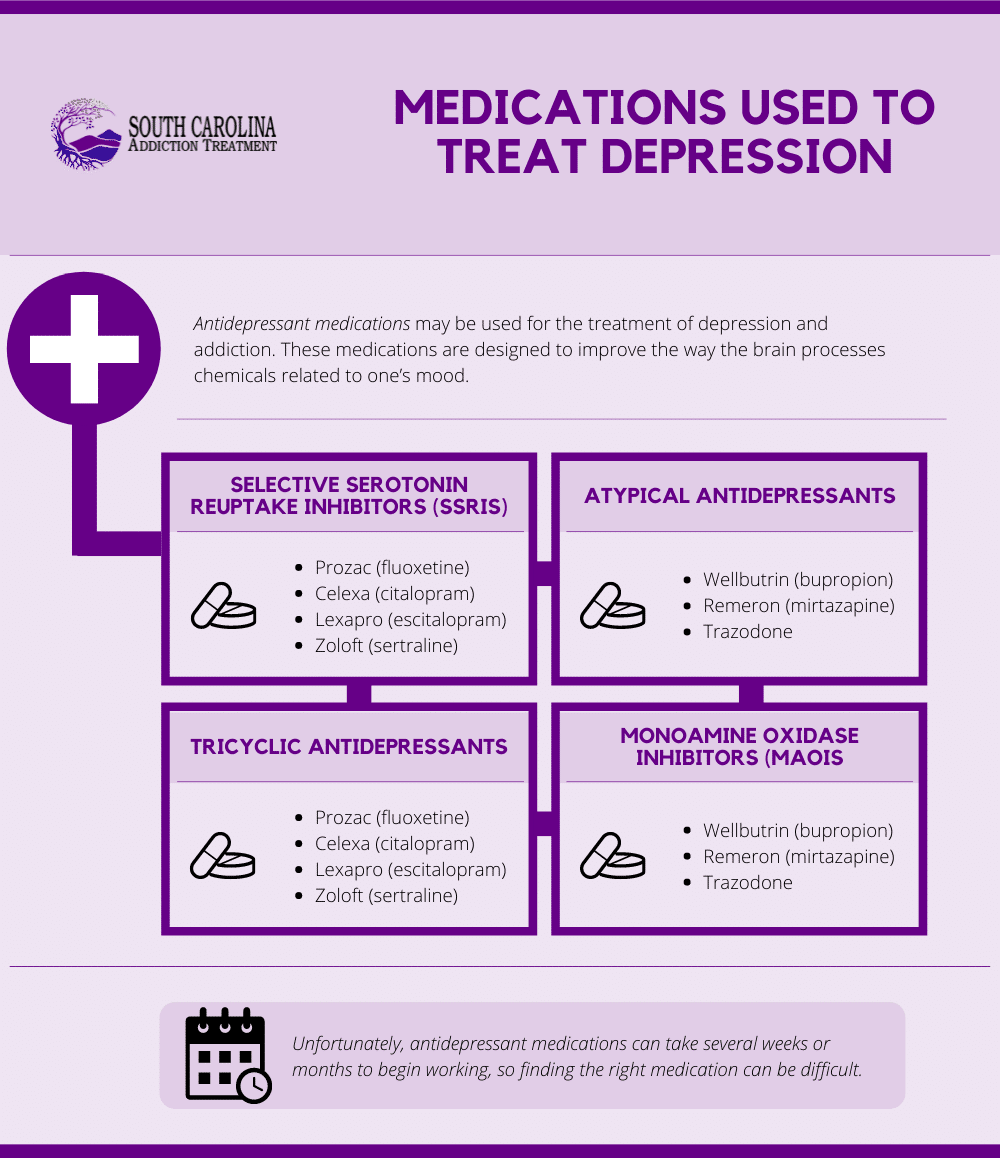Treatment for Depression and Addiction in South Carolina

Medically Verified: 2/1/24
Medical Reviewer
Chief Editor

All of the information on this page has been reviewed and verified by a certified addiction professional.
People who struggle with addiction and alcoholism often struggle with depression, as well. Studies estimate 16.5% of individuals with major lifetime depression had an alcohol use disorder and 18% had a drug use disorder.[1] Similarly, people who struggle with depression are more likely to abuse substances, and people who abuse substances are more likely to develop depression.
Sadly, co-occurring disorders like depression and addiction can complicate the treatment and recovery process. Leaving depression undiagnosed or untreated can lead to a return to drugs and alcohol. At the same time, neglecting a person’s substance abuse issues and only treating their depression is unlikely to make any of their depressive symptoms better. Instead, both conditions must be treated at the same time.
Dual diagnosis treatment programs in South Carolina provide treatment for depression and addiction on an inpatient and outpatient basis. Individuals can learn to live sober lives while keeping their depression under control.

The Relationship Between Depression and Addiction
There are many different types of depression, including:
- Major depression – depressive symptoms that last more than two weeks and impact one’s quality of life
- Dysthymia – a milder form of major depression that lasts for one to two years and can turn into major depression
- Seasonal affective disorder (SAD) – depressive symptoms appear during the wintertime and are associated with variations of light
- Atypical depression – symptoms of depression that can be briefly reduced with news of a positive or exciting event
People with depression experience debilitating symptoms like sadness, lack of energy, loss of interest in hobbies, and sleeping difficulties. They may also struggle with thoughts of self-harm or suicide. Depression can be so painful that some people seek relief by using drugs or alcohol.
Unfortunately, depressed mood is among one of the most frequently cited reasons for relapse among people with substance use disorders.[2]
Dual Diagnosis Treatment for Depression and Addiction
Although some depressive symptoms subside after a period of abstinence, depression and depressive conditions often come before addiction develops. As a result, these conditions are deeply intertwined, and individuals affected by both conditions need specific treatment for both depression and addiction. This treatment can be provided through a dual diagnosis treatment program.
Detox is the First Step
Before treatment can begin, individuals must be completely detoxed from drugs and alcohol. Detox should always take place in a medical facility. Detox medications like Suboxone, Methadone, or benzodiazepines may be administered to help reduce the severity of withdrawal symptoms. In some cases, antidepressant medications can also be started during this time to begin stabilizing brain chemistry. After detox, patients move onto the treatment portion of rehab.
Medications
Antidepressant medications may be used for the treatment of depression and addiction. These medications are designed to improve the way the brain processes chemicals related to one’s mood. Unfortunately, antidepressant medications can take several weeks or months to begin working, so finding the right medication can be difficult.[3]
Some of the most commonly prescribed antidepressants include:
- Selective serotonin reuptake inhibitors (SSRIs) – examples include Prozac (fluoxetine), Celexa (citalopram), Lexapro (escitalopram), and Zoloft (sertraline).
- Atypical antidepressants – examples include Wellbutrin (bupropion), Remeron (mirtazapine), and Trazodone.
- Tricyclic antidepressants – examples include Elavil (amitriptyline), Anafranil (clomipramine), and Surmontil (trimipramine).
- Monoamine oxidase inhibitors (MAOIs) – examples include Azilect (rasagiline), Marplan (isocarboxazid), and Nardil (phenelzine).
Depression and substance abuse are best treated on an inpatient basis. Patients will meet with their prescribing doctor on a weekly basis to discuss their medications, side effects, and depression symptoms.

Individualized Dual Diagnosis Therapy
Dual diagnosis rehab is an approach that uses behavioral therapy and counseling to address both addiction and co-occurring mental health conditions like depression. Therapy may be held on a group or individual basis and should consider each patients’ unique needs, beliefs, background, and more.
Cognitive-behavioral therapy (CBT) is one of the most commonly used therapies used in the treatment of depression and addiction in South Carolina. CBT focuses on addressing negative thought patterns and behaviors that contribute to depression and addiction. It helps patients recognize unhealthy patterns and adopt healthy coping skills. Other types of therapy used for depression include:
- Dialectical Behavior Therapy (DBT) – A type of CBT that focuses more on thought processes and mindfulness.
- Psychodynamic Therapy – This therapy aims to make patients more aware of their full range of emotions–both good and bad. This can help build self-awareness and increase emotional capacity.
- Interpersonal Therapy – Focuses on addressing past and present roles in interpersonal relationships. This approach promotes conflict resolution and communication skills.
These therapies are also combined with relapse prevention strategies and addiction education. When the right balance between medication, therapy, and relapse prevention is found, individuals suffering from depression and addiction can live healthy, productive lives.
Peer Support
Peer support is a crucial part of the recovery process. Individuals who have a strong support network, a supportive family, and a healthy home life are more likely to stay sober. During rehab, patients participate in group therapy sessions where they can begin relating to and building relationships with like-minded individuals. After treatment, patients are encouraged to join a 12-Step fellowship or attend other recovery-based meetings so they can obtain support from others.
Find Treatment for Depression and Addiction in South Carolina Today
Here at South Carolina Addiction Treatment, our family-owned and operated facility treats you as more than just a patient–we treat you as one of our own. We’ll help you get through detox safely, find the right treatment medications that work for you, and excel in your therapy sessions. When you leave our treatment program for depression and addiction in South Carolina, you’ll be armed with the tools you need to stay sober, cope with depressive symptoms, and improve your quality of life.
Don’t wait any longer. Contact us today to begin treatment.
References:

